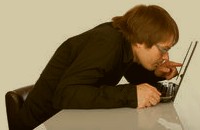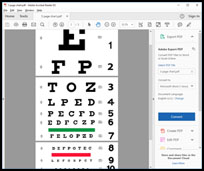When I took a week-long workshop with Peter Grunwald, developer of the vision improvement Eyebody Method, he separated us into groups depending on our particular visual condition. As he beckoned my group of near-sighted folks to come up and work with him in more depth, we crowded around him so closely, he joked that it was like we wanted to sit in his lap! Myopes seem to want to get as close as possible to something to see it clearly. And like many habits, this behavior can take on a life of its own, until you’re doing it without even thinking about it.
In observing myself and my looking habits, with the goal of identifying and undoing any unconscious myopic patterns, I realized I get close to things, then I look. This is like salting the food before I taste it! Maybe it’s seasoned perfectly already. And maybe I’m already at the perfect distance to see what I want to see, whether it’s my computer screen or the page of a book or something across the room or out the window.

Dr. Jacob Liberman, in his vision improvement classic “Take Off Your Glasses And See”, writes about scanning the eyechart in his optometrist office between sessions with his patients, without his glasses, and seeing it gradually clear up. I read this book (several times) early in my own vision improvement, and was particularly struck by how he let the clarity come to him — he didn’t chase it. It appeared on its own, just like grass growing. He let it happen, not interfering with the natural easy process of seeing by trying to force it to happen.
Taking off glasses, then struggling and straining to see, isn’t doing you or your visual system any favors. Nor is getting so close to something to see it, that you lose all awareness of the periphery, which gives the central view context. I look at the photo of the guy with his nose a few inches from his laptop screen, peering at it intently, and I can just feel the eyestrain building, the area between my eyebrows getting sore. And look at the curve in his back, and his hunched-up shoulders. Yikes!
The habit of being too near to reading material for healthy looking is a long-standing one for me. There’s an old photo of me, about age 3, “reading” a picture book to my younger sister, with my face almost a foot and a half away from the book. I didn’t have glasses yet, so my vision habits were healthy then. And I’m also remembering a photo from my college yearbook, with me sitting outside in the sun studying for finals. I’m holding the book about 16 inches away, in bright sunshine, while I wear -10 hard contacts. I wore these at all times, unless I was sleeping. This is quite a degradation in my vision!
And bad habits can be undone. As often as I remember, I check in with my posture to see if I’m leaning forward to supposedly see better. The main place I notice I’m still doing this consistently is at the computer. If a cloud covers the sun outside the window in front of me and the room is suddenly dimmer, I can turn on the overhead light rather than bending toward the screen. I’m afraid I’ve taken Dr. Bates’ words about challenging visual conditions, like low light, being good for vision practice to extremes. It’s good for my vision only if I’m not straining!
If I can’t see well enough to read, what are my options, other than getting closer? More light. Take the material outside where natural light will help me see. Palm first, or take a break and go for a walk, to relax my visual system. Take my time. As I said earlier, rushing and grabbing at the letters, which is a bad habit I can still fall into if I’m not careful, can interfere with the clarity I seek. And it can also lead to a downward spiral of feeling like I’m failing, as I lean closer and closer to the screen.
A lot of this is about awareness and being present, not on auto-pilot. I notice I’m in the bad habit, and I correct it. And again, and again. Over time it slowly gets better, until the undesirable behavior starts to fade away, like an overgrown unused road, and the healthier pattern is my normal way of living my life. (I mis-typed “loving my life” which is true too!). Is there an unwanted habit you’d like to start replacing with something better for you and those around you? Can you start today with a small step? And remember to have fun with it, as you explore the New You.
I wore strong glasses, then contact lenses, from age 5 into my 40s. While making many mistakes, eventually l learned how to improve the way I use my eyes and to see in a more relaxed, healthy manner. It is my pleasure to coach others to do the same. Visit me at https://NancyLNeff.com.

Hi again Nancy,
I am still scrolling through your posts, as I have not been here for months.
I am wearing my bifocal correction glasses, because my eyes are tired, even after taking breaks, and practicing the 20 20 20 rule.
Thank you for this as it has made me aware of my habits of leaning into my computer, and holding reading material too close. I seem to do this more when doing close work without my bifocal correction, and only looking through my minus power spherical equivalent to correct my astigmatism. Funny thing is one would think that looking through minus lenses at close material you would tend to push it farther away. Perhaps it is because the sphere in my case is not to correct myopia, but rather astigmatism. Another bad habit is leaning into a mirror when I can see myself perfectly clearly.
Hi Dale. For me personally the work is about noticing, altering an unhelpful habit slightly, then noticing more. Awareness is at the root of it. An unexamined life is not worth living! I don’t criticize myself much any more for doing it “wrong”, like going too long at the computr without a break, I just thank my eyes for putting up with me and try to do better.
I don’t criticize myself much any more for doing it “wrong”, like going too long at the computr without a break, I just thank my eyes for putting up with me and try to do better.
Did Peter Grunwald, developer of the vision improvement Eyebody Method, help you see better?
I did two 7-day workshops with Peter in successive years, where he taught me a lot of good habits, and planted some seeds which I am still harvesting. Walking after dark without glasses, connecting to what I’m looking at even if it’s blurry, and the one I wrote about here, not needing to get super-close to something before I expect to see it clearly, are just a few which come to mind.
Walking after dark without glasses, connecting to what I’m looking at even if it’s blurry, and the one I wrote about here, not needing to get super-close to something before I expect to see it clearly, are just a few which come to mind.
Nancy I love your bravery and honesty as you tease apart your own habits and experiences! Thanks for this!
Oh Gwen, thanks so much for reading, and especially for responding! Sometimes I think I’m just talking to myself. And I’ve never thought of myself as brave, unless it’s feeling afraid and going forward anyway, since I do this a lot. If I want to continue to grow and learn and improve, that’s my only choice. Here’s to improvement for all of us, visually and otherwise.
And I’ve never thought of myself as brave, unless it’s feeling afraid and going forward anyway, since I do this a lot. If I want to continue to grow and learn and improve, that’s my only choice. Here’s to improvement for all of us, visually and otherwise.